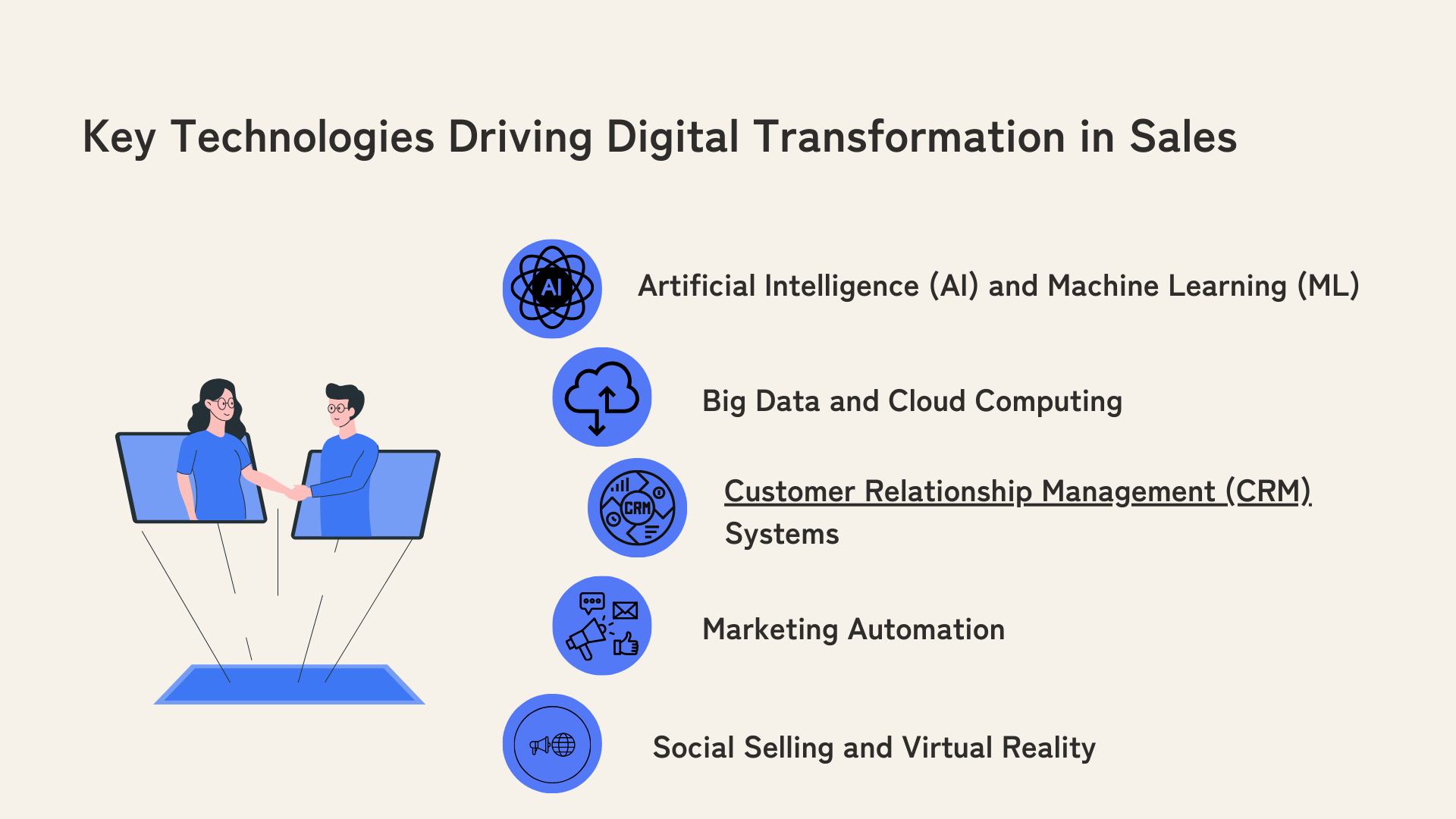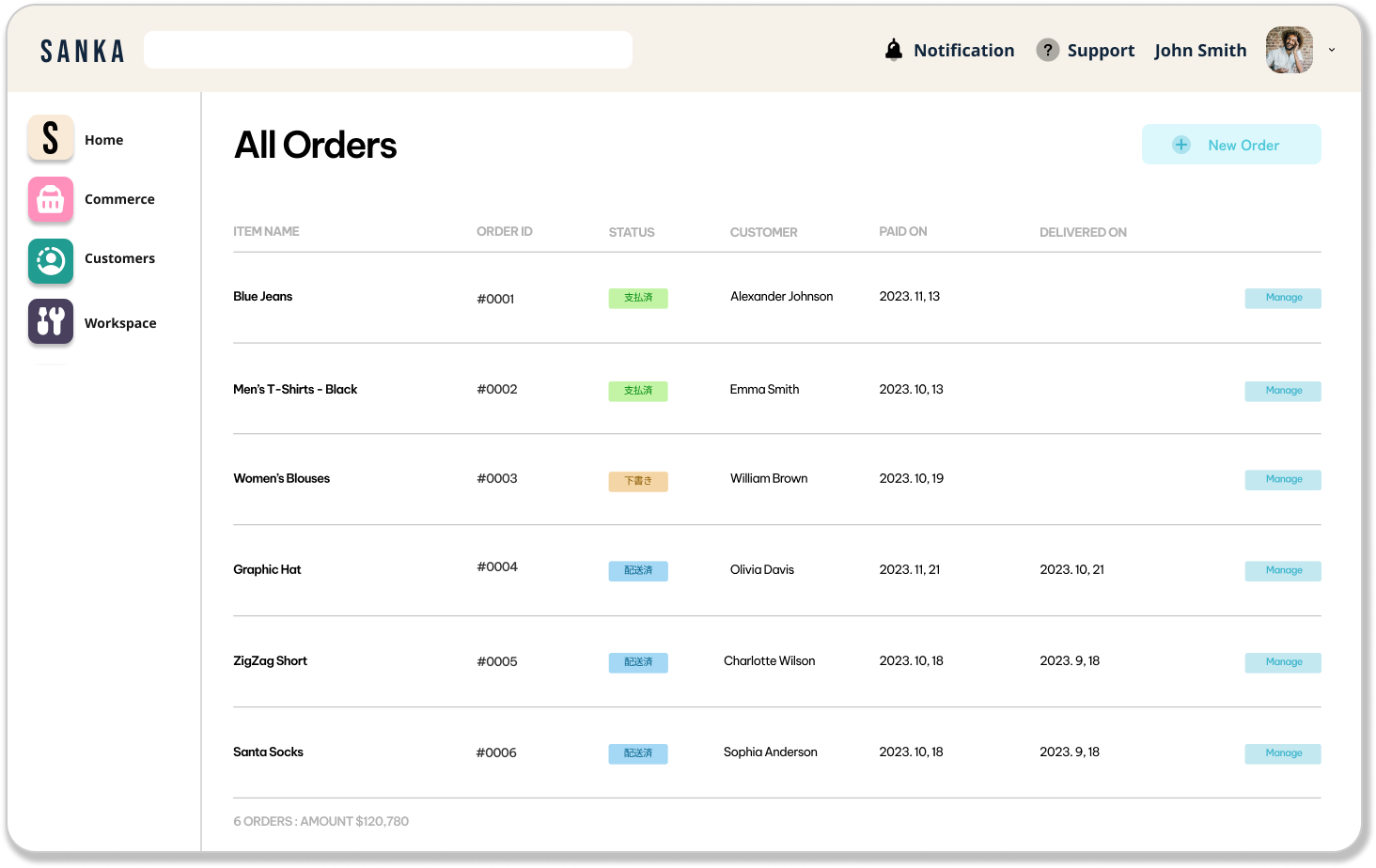Introduction
Change is the only constant, and the world of sales is not immune. With technology evolving at a lightning-fast pace and customer demands growing more sophisticated, businesses need to adapt to stay competitive.
Digital Transformation (DX) for Sales is key to driving organizational success and capitalizing on the benefits of emerging technologies.
Embracing digital transformation not only streamlines sales processes but also meets evolving customer expectations while ensuring sustainable growth.
In this post, we will discuss the importance of DX in sales and share inspiring success stories of global brands that have harnessed digital strategies to boost their sales performance.
Understanding Digital Transformation in Sales
Digital transformation in sales refers to the profound, strategic integration of digital technologies into a business's sales processes, operations, and strategies to improve efficiency, flexibility, and performance.
It's an evolving initiative that reflects market trends, customer behavior, and emerging technologies.
DX involves using emerging technologies, such as artificial intelligence (AI), big data, and automation, to enhance sales processes, boost productivity, drive customer engagement, and ultimately increase revenue.
The Importance of Digital Transformation in Sales
As consumers increasingly rely on digital channels for purchasing, sales teams must leverage technology for managing customer relationships, lead identification, and sales management.
Below, we delve deeper into how digital transformation redefines sales outcomes, helping to meet evolving customer needs, gaining a competitive edge, improving lead generations and conversions, enhancing operational efficiency, and fostering greater collaboration among sales teams.
#1 Meeting Evolving Customer Needs
In today's digital era, customers are well-informed and have high expectations. They demand personalized buying experiences, instant responses, and superior after-sales service.
"80% of consumers are more likely to make a purchase when brands offer personalized experiences," shows how critical personalization has become in the marketplace.
Embracing digital transformation allows businesses to leverage artificial intelligence (AI) and data analytics to gain detailed insights into customer behavior and preferences.
These insights enable a more focused, personal sales approach, helping to meet and even exceed customers' evolving needs.
For example, predictive analytics tools can anticipate customer's future needs based on their past behavior, helping sales reps in recommending products or services proactively.
Such personalized attention enhances customer satisfaction and loyalty.
#2 Gaining a Competitive Edge
Digital transformation in sales is not just about staying relevant; it's about staying ahead.
Companies that leverage digital tools mobilize a wealth of data efficiently, accelerating their decision-making processes, and gaining a competitive edge.
Advanced CRM systems, AI-based sales analytics, and automated marketing campaigns can position businesses at the forefront of their sectors, standing out from competitors.
#3 Improving Lead Generation and Conversion
Digital transformation introduces businesses to a host of lead generation and conversion optimization tools.
AI-driven analytics can be used to identify likely prospects based on various data points, improving the quality of lead generation.
Simultaneously, automation tools enhance the follow-up process. For instance, email marketing automation can help to send personalized follow-up emails to leads at the right time, significantly improving the probability of conversions.
Machine learning algorithms can also help identify optimal conversion pathways, allowing businesses to repeat success and identify areas for improvement.
#4 Enhancing Operational Efficiency
Improving efficiency is one of the core objectives of digital transformation in sales.
By replacing manual, time-consuming tasks with automated solutions, businesses reduce errors, save time, increase productivity, and enhance overall sales performance.
Automated CRM systems, for instance, can effortlessly handle tasks like updating customer contacts, scheduling follow-ups, and managing sales pipelines.
Such automation offers sales teams more time to focus on critical tasks, such as strategizing and building customer relationships.
#5 Fostering Collaboration Among Sales Teams
Digital tools also foster collaboration in sales teams, making it easier to share insights, coordinate efforts, and work towards common objectives.
Cloud-based CRMs, for example, provide a unified platform where sales representatives can access shared databases, interact with one another, track progress, and manage tasks.
This interconnectedness streamlines processes, reduces redundancies, and ensures everyone's working with the latest data, leading to a more cohesive and effective sales team.
Key Technologies Driving Digital Transformation in Sales

Several technologies are driving DX in sales, helping organizations reinvent the way they go-to-market, engage with customers and manage sales processes.
- Artificial Intelligence (AI) and Machine Learning (ML): AI-powered tools equip sales teams with predictive analytics, providing valuable insights into customer buying patterns and preferences. ML algorithms allow for real-time sales data analysis, enabling better decision-making and targeted sales campaigns.
- Big Data and Cloud Computing: Big data allows organizations to compile vast amounts of structured and unstructured data, while cloud computing enables easy sharing and accessibility of this information. Combined, these technologies allow sales teams to identify patterns and insights for increased sales effectiveness.
- Customer Relationship Management (CRM) Systems: Modern CRM systems are central to digital transformation. They offer an integrated digital platform for managing customer data, automating processes, and providing a 360-degree view of customer interactions.
- Marketing Automation: Automation tools help streamline the sales process by automating repeatable tasks, such as lead nurturing, social media management, and email marketing.
- Social Selling and Virtual Reality: Social selling leverages social media platforms to connect with prospective customers and maintain relationships with existing ones. Virtual reality (VR) technology also offers immersive experiences that engage customers and help close sales.
Strategies for Implementing Digital Transformation in Sales
Implementing digital transformation for sales requires a comprehensive approach, incorporating technology, processes, and people.
A well-thought-out strategy remains vital to ensure its success and mitigate potential risks.
This section will explore strategies to consider when implementing digital transformation in your sales department, along with detailed explanations and practical examples for clearer understanding.
#1 Define Clear Objectives
Begin by determining the ultimate goals of DX within the sales organization, whether they focus on improved customer engagement, increased revenue, or enhanced operational efficiency.
Your objectives should be Specific, Measurable, Achievable, Relevant, and Time-bound (SMART).
For instance, a defined goal could be "Increase the conversion rate by 15% within the next six months using AI-powered lead scoring."
Clear objectives ensure that every member of your sales team understands why this transformation is important, which can improve individual and collective focus and motivation.
#2 Assess Available Technologies
Evaluate existing technologies in the market, and select those that align with the specific needs of your sales team and objectives.
This process includes researching AI solutions, CRM systems, data analytics software, marketing automation tools, and other tech that could refine your sales process.
Continuing from the previous example, you might study different AI lead scoring tools to find one that provides the most accurate predictions based on your specific sales data.
#3 Implement a Scalable CRM System
A Customer Relationship Management (CRM) system is essential for managing your customer data, tracking interactions, and streamlining processes.
Choose a CRM system that integrates with your existing technology stack, is scalable, and will grow as your business expands.
A scalable system will accommodate increasing data volumes and growing workloads overtime, presenting a cost-effective solution.
For instance, Sanka offers a scalable CRM solution with extensive customization options that can handle, manage and analyze large quantities of data effectively, making it suitable for businesses of all sizes.
It offers seamless integration with other business apps and remarkable user-friendliness, making it an apt choice for startups to global enterprises.
With Sanka, businesses can focus more on nurturing client relationships and less on manual tasks.
#4 Develop a Digital-First Mindset
Ensuring that your organization embraces a digital-first mindset is essential to the success of your DX for sales implementation.
Encourage an open, growth-driven attitude towards innovation and technology.
For instance, consider Slack, which started as a gaming company and pivoted successfully into a digital communication platform.
Its digital-first mindset allowed it to evolve and become a multi-billion-dollar company.
#5 Train Sales Teams
Invest in training sales teams to leverage technology effectively. As new technologies are adopted, ongoing training will be essential for ensuring the digital transformation journey remains successful.
Ensure your team understands how to use new technologies effectively. This means investing in training or hiring experts who can guide your team.
For example, if you've adopted a new AI-powered tool for predictive analytics, make sure your sales teams know how to interpret and apply these predictions to improve their sales strategies.
#6 Measure and Iterate
No digital transformation strategy is complete without monitoring and improving continually.
Use KPIs to measure the effectiveness of your efforts, and make the necessary adjustments. Ensure your KPIs align with your business objectives.
For instance, if your goal was to "Increase the conversion rate by 15%," keep track of your conversion rates before and after implementing your AI lead scoring tool.
If you notice improvements, continue refining your use of the tool. If not, you may need to reassess your strategy or consider other tools.
Continuously measure the outcomes of your digital transformation initiatives and iteratively improve processes.
Coca Cola's Success Story: Implementing Digital Transformation in Sales
The Coca Cola Company, an iconic global brand, presents a compelling case study showcasing the effective implementation of digital transformation in sales.
This 135-year-old organization has proven that a forward-thinking digital strategy can equip even long-established brands with a powerful advantage in the modern business landscape.
Digital Marketing for Greater Engagement
Coca Cola has been harnessing the power of digital marketing to engage with consumers on a more personal and emotional level.
By developing digital campaigns such as the "Share a Coke" campaign, where consumers could find their names printed on Coke bottles and cans, they've implemented a powerful digital-first approach.
The campaign’s success was in large part due to its social media strategy, with individuals worldwide sharing pictures of personalized Coke cans and tagging others.
This strategy increased customer engagement, generated user-generated content and significantly boosted sales, showing that a creative, digitally-oriented marketing strategy can translate into tangible sales results.
Harnessing Big Data to Understand Consumers Better
Big Data plays a significant role in Coca Cola's digital transformation journey. The company makes intelligent use of customer data to understand their preferences and behaviors.
They employ AI-driven analytics to dissect vast amounts of data collected from different customer touchpoints, creating actionable insights that shape their sales strategies.
By understanding patterns and identifying trends, Coca Cola can anticipate demand and adjust sales plans suitably.
They can tailor products and marketing strategies to meet ever-changing consumer preferences.
For instance, the launch of smaller 250ml cans, influenced by data indicating consumer interest in portion control, caused a notable surge in sales figures.
CRM Integration for Enhanced Customer Experiences
Coca Cola has always aimed to place its customers at the heart of its business.
To manage its customer relationships more efficiently, the company implemented CRM system.
This system allows them to consolidate customer information, track interactions, and manage relationships more effectively.
With cloud-based CRM, Coca Cola's sales team can access real-time customer data, enabling them to deliver faster and more personalized customer services.
For instance, the salespeople can plan visits based on prioritized accounts or opportunities, enabling them to spend more time selling and less time planning.
This efficient management of customer relationships has resulted in better customer experiences, thereby boosting sales.
Embracing the Power of AI
Coca Cola embraces Artificial Intelligence (AI) to increase sales and enhance market engagement.
They utilize AI-powered chatbots for automating customer service on social media platforms.
The digital assistant engages with customers in real-time, answering queries, helping with purchases, or directing them to human representatives, if needed.
AI is also integrated into Coca Cola's vending machines in the form of digital assistants.
These machines engage with customers in an interactive manner, suggesting drinks based on their previous choices and the current weather.
This level of personalized interaction provided by AI not only enhances customer experience but also promotes impulse buying, leading to higher sales.
Adapting to the E-commerce Wave
Coca Cola also saw a huge opportunity in the growing e-commerce sector. It took steps to digitize its sales channels by partnering with various online delivery platforms across the globe.
By making its products available online, Coca Cola managed to expand its customer base and generate higher sales, appealing to tech-savvy consumers' needs for convenience.

Conclusion
Ultimately, embracing Digital Transformation for Sales can propel any business towards success by revolutionizing sales strategies and processes.
The world is shifting and adapting at a rapid rate, making it increasingly crucial for businesses to stay agile and responsive.
Through digital innovation, businesses can effectively engage their customers, leverage intelligent sales tactics, and achieve unparalleled success.
Now is the time to embrace the power of digital transformation and prime your business to excel in the modern marketplace.
Make the change, and unlock a world of opportunities by transforming your sales operations.







